NSB303: Colorectal Cancer Case Study and Discharge Planning
VerifiedAdded on 2022/11/14
|9
|2375
|89
Report
AI Summary
This report presents a case study of a 62-year-old male diagnosed with colorectal cancer, focusing on the development of a survivorship care plan following adjuvant chemotherapy. The report details the essential components of discharge planning, including patient assessment, communication, and coordination, with the involvement of family. It emphasizes the importance of patient education on drug adherence, self-management, and follow-up care, as well as collaborative approaches to manage pain and prevent recurrence. The report also highlights the need for a multidisciplinary team, including oncologists, nurses, dieticians, and physiotherapists, to provide comprehensive care, covering dietary modifications, laboratory tests, and management of signs, symptoms, and medication side effects. The goal is to enhance recovery and prevent recurrence through a collaborative approach between the healthcare team and the patient. The report also mentions the need for monitoring and reporting any signs of recurrence and emphasizes the importance of maintaining a healthy lifestyle.
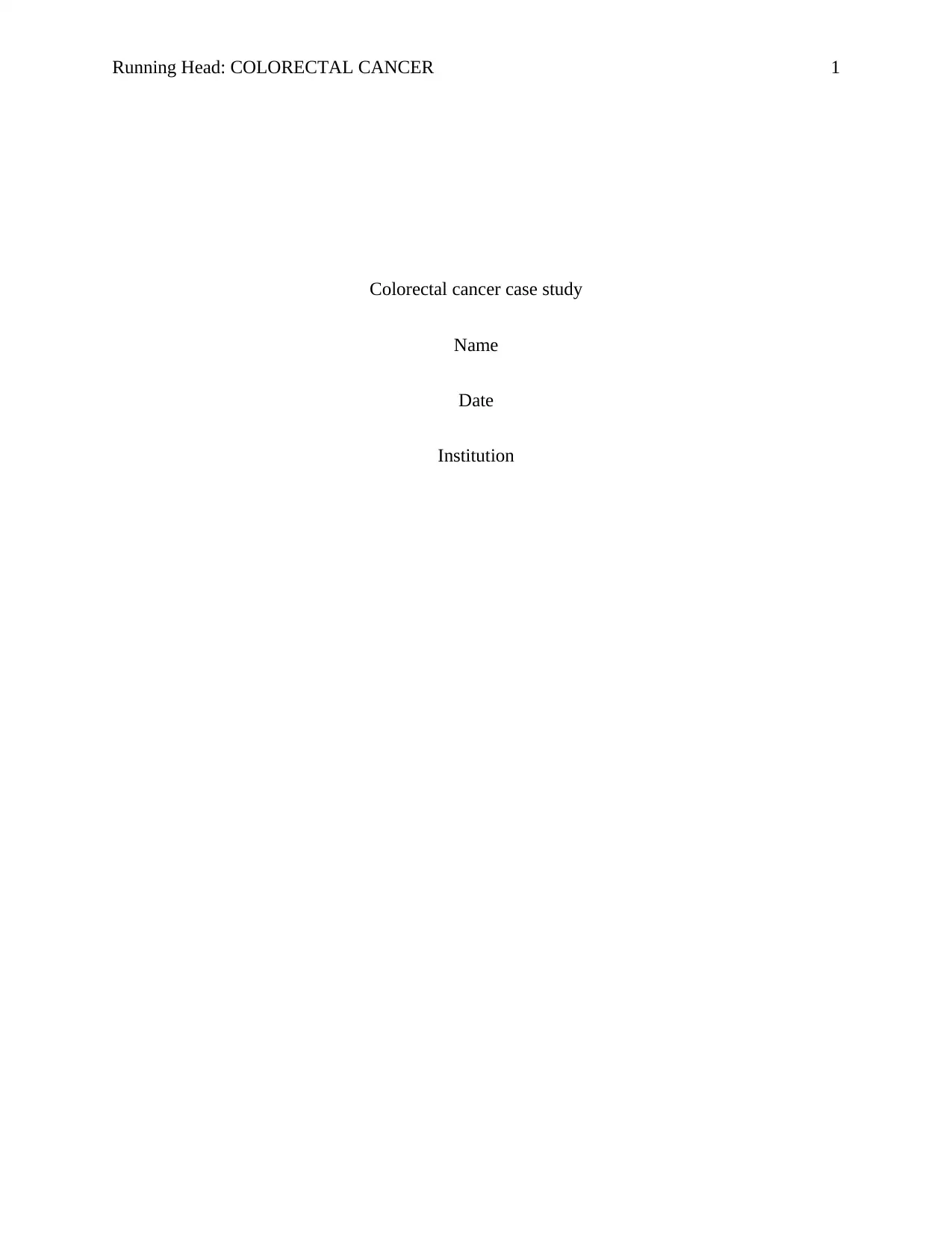
Running Head: COLORECTAL CANCER 1
Colorectal cancer case study
Name
Date
Institution
Colorectal cancer case study
Name
Date
Institution
Paraphrase This Document
Need a fresh take? Get an instant paraphrase of this document with our AI Paraphraser
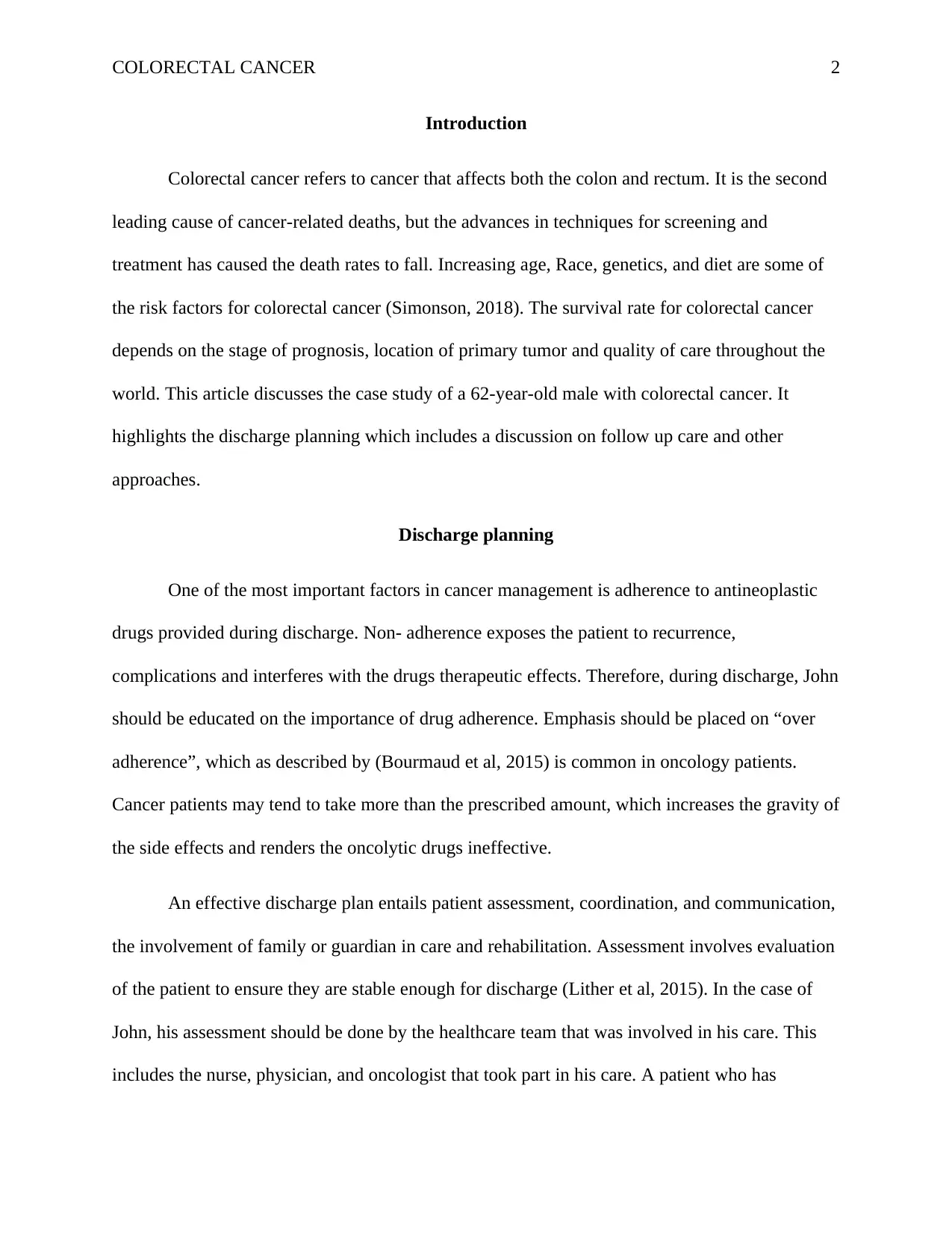
COLORECTAL CANCER 2
Introduction
Colorectal cancer refers to cancer that affects both the colon and rectum. It is the second
leading cause of cancer-related deaths, but the advances in techniques for screening and
treatment has caused the death rates to fall. Increasing age, Race, genetics, and diet are some of
the risk factors for colorectal cancer (Simonson, 2018). The survival rate for colorectal cancer
depends on the stage of prognosis, location of primary tumor and quality of care throughout the
world. This article discusses the case study of a 62-year-old male with colorectal cancer. It
highlights the discharge planning which includes a discussion on follow up care and other
approaches.
Discharge planning
One of the most important factors in cancer management is adherence to antineoplastic
drugs provided during discharge. Non- adherence exposes the patient to recurrence,
complications and interferes with the drugs therapeutic effects. Therefore, during discharge, John
should be educated on the importance of drug adherence. Emphasis should be placed on “over
adherence”, which as described by (Bourmaud et al, 2015) is common in oncology patients.
Cancer patients may tend to take more than the prescribed amount, which increases the gravity of
the side effects and renders the oncolytic drugs ineffective.
An effective discharge plan entails patient assessment, coordination, and communication,
the involvement of family or guardian in care and rehabilitation. Assessment involves evaluation
of the patient to ensure they are stable enough for discharge (Lither et al, 2015). In the case of
John, his assessment should be done by the healthcare team that was involved in his care. This
includes the nurse, physician, and oncologist that took part in his care. A patient who has
Introduction
Colorectal cancer refers to cancer that affects both the colon and rectum. It is the second
leading cause of cancer-related deaths, but the advances in techniques for screening and
treatment has caused the death rates to fall. Increasing age, Race, genetics, and diet are some of
the risk factors for colorectal cancer (Simonson, 2018). The survival rate for colorectal cancer
depends on the stage of prognosis, location of primary tumor and quality of care throughout the
world. This article discusses the case study of a 62-year-old male with colorectal cancer. It
highlights the discharge planning which includes a discussion on follow up care and other
approaches.
Discharge planning
One of the most important factors in cancer management is adherence to antineoplastic
drugs provided during discharge. Non- adherence exposes the patient to recurrence,
complications and interferes with the drugs therapeutic effects. Therefore, during discharge, John
should be educated on the importance of drug adherence. Emphasis should be placed on “over
adherence”, which as described by (Bourmaud et al, 2015) is common in oncology patients.
Cancer patients may tend to take more than the prescribed amount, which increases the gravity of
the side effects and renders the oncolytic drugs ineffective.
An effective discharge plan entails patient assessment, coordination, and communication,
the involvement of family or guardian in care and rehabilitation. Assessment involves evaluation
of the patient to ensure they are stable enough for discharge (Lither et al, 2015). In the case of
John, his assessment should be done by the healthcare team that was involved in his care. This
includes the nurse, physician, and oncologist that took part in his care. A patient who has
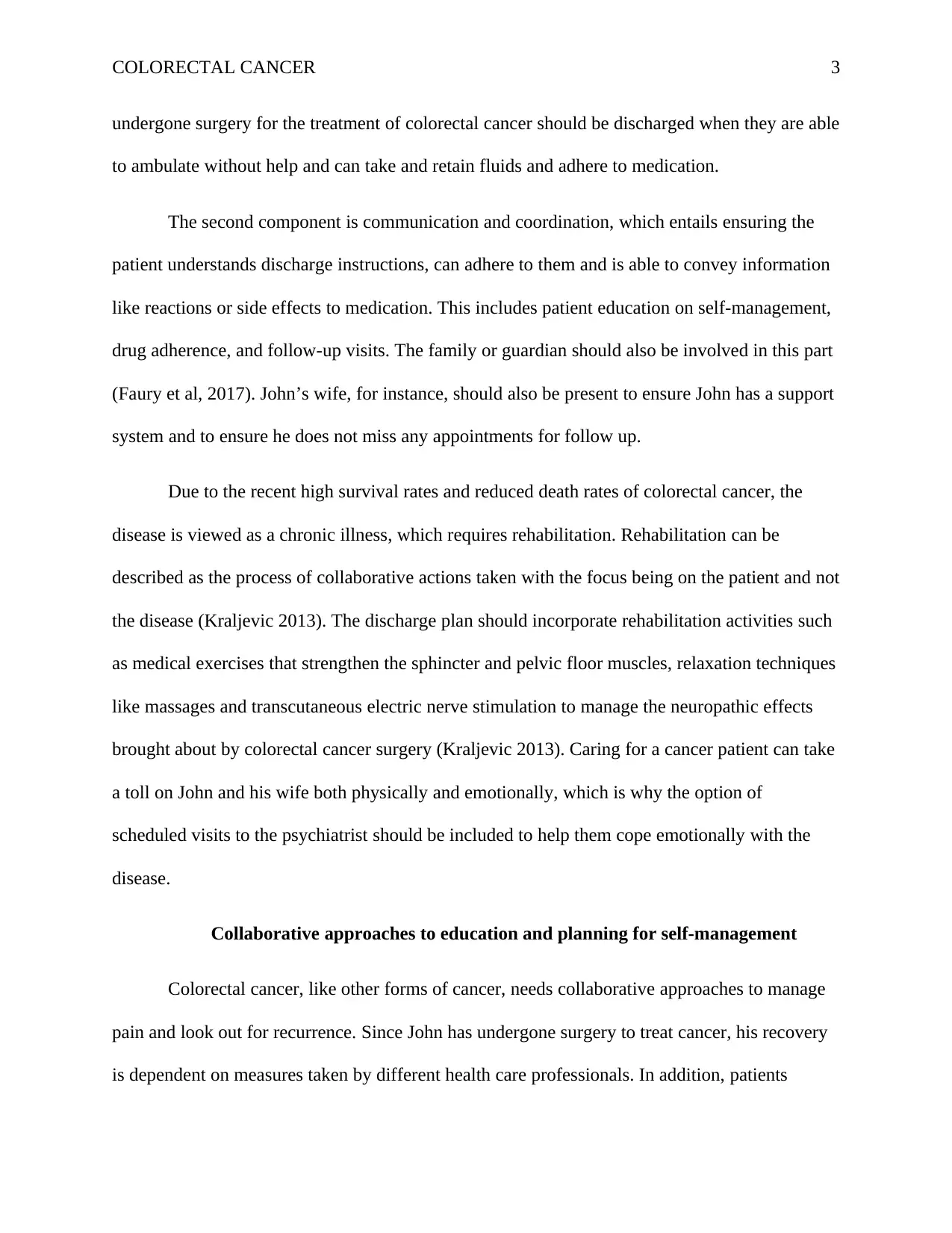
COLORECTAL CANCER 3
undergone surgery for the treatment of colorectal cancer should be discharged when they are able
to ambulate without help and can take and retain fluids and adhere to medication.
The second component is communication and coordination, which entails ensuring the
patient understands discharge instructions, can adhere to them and is able to convey information
like reactions or side effects to medication. This includes patient education on self-management,
drug adherence, and follow-up visits. The family or guardian should also be involved in this part
(Faury et al, 2017). John’s wife, for instance, should also be present to ensure John has a support
system and to ensure he does not miss any appointments for follow up.
Due to the recent high survival rates and reduced death rates of colorectal cancer, the
disease is viewed as a chronic illness, which requires rehabilitation. Rehabilitation can be
described as the process of collaborative actions taken with the focus being on the patient and not
the disease (Kraljevic 2013). The discharge plan should incorporate rehabilitation activities such
as medical exercises that strengthen the sphincter and pelvic floor muscles, relaxation techniques
like massages and transcutaneous electric nerve stimulation to manage the neuropathic effects
brought about by colorectal cancer surgery (Kraljevic 2013). Caring for a cancer patient can take
a toll on John and his wife both physically and emotionally, which is why the option of
scheduled visits to the psychiatrist should be included to help them cope emotionally with the
disease.
Collaborative approaches to education and planning for self-management
Colorectal cancer, like other forms of cancer, needs collaborative approaches to manage
pain and look out for recurrence. Since John has undergone surgery to treat cancer, his recovery
is dependent on measures taken by different health care professionals. In addition, patients
undergone surgery for the treatment of colorectal cancer should be discharged when they are able
to ambulate without help and can take and retain fluids and adhere to medication.
The second component is communication and coordination, which entails ensuring the
patient understands discharge instructions, can adhere to them and is able to convey information
like reactions or side effects to medication. This includes patient education on self-management,
drug adherence, and follow-up visits. The family or guardian should also be involved in this part
(Faury et al, 2017). John’s wife, for instance, should also be present to ensure John has a support
system and to ensure he does not miss any appointments for follow up.
Due to the recent high survival rates and reduced death rates of colorectal cancer, the
disease is viewed as a chronic illness, which requires rehabilitation. Rehabilitation can be
described as the process of collaborative actions taken with the focus being on the patient and not
the disease (Kraljevic 2013). The discharge plan should incorporate rehabilitation activities such
as medical exercises that strengthen the sphincter and pelvic floor muscles, relaxation techniques
like massages and transcutaneous electric nerve stimulation to manage the neuropathic effects
brought about by colorectal cancer surgery (Kraljevic 2013). Caring for a cancer patient can take
a toll on John and his wife both physically and emotionally, which is why the option of
scheduled visits to the psychiatrist should be included to help them cope emotionally with the
disease.
Collaborative approaches to education and planning for self-management
Colorectal cancer, like other forms of cancer, needs collaborative approaches to manage
pain and look out for recurrence. Since John has undergone surgery to treat cancer, his recovery
is dependent on measures taken by different health care professionals. In addition, patients
⊘ This is a preview!⊘
Do you want full access?
Subscribe today to unlock all pages.

Trusted by 1+ million students worldwide
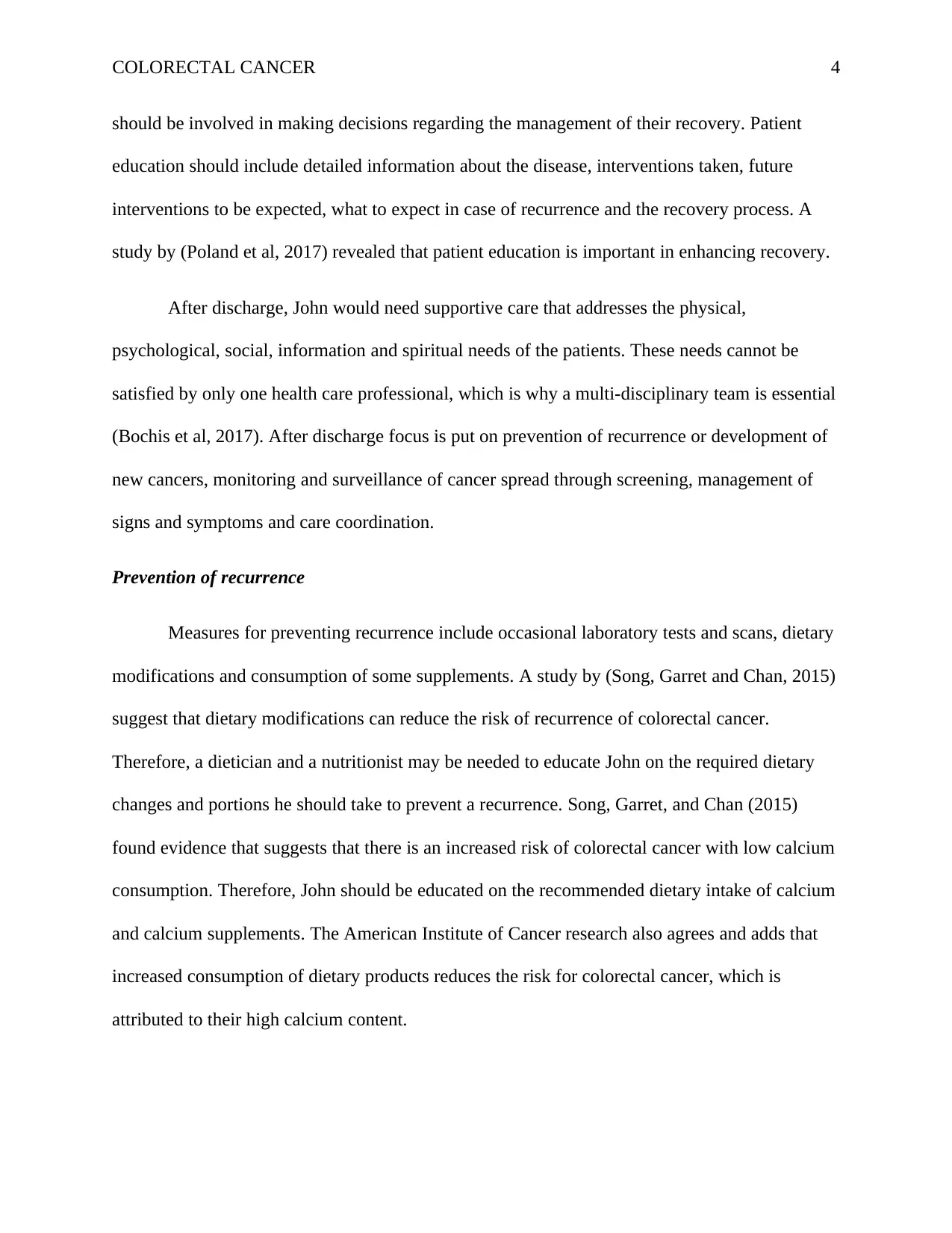
COLORECTAL CANCER 4
should be involved in making decisions regarding the management of their recovery. Patient
education should include detailed information about the disease, interventions taken, future
interventions to be expected, what to expect in case of recurrence and the recovery process. A
study by (Poland et al, 2017) revealed that patient education is important in enhancing recovery.
After discharge, John would need supportive care that addresses the physical,
psychological, social, information and spiritual needs of the patients. These needs cannot be
satisfied by only one health care professional, which is why a multi-disciplinary team is essential
(Bochis et al, 2017). After discharge focus is put on prevention of recurrence or development of
new cancers, monitoring and surveillance of cancer spread through screening, management of
signs and symptoms and care coordination.
Prevention of recurrence
Measures for preventing recurrence include occasional laboratory tests and scans, dietary
modifications and consumption of some supplements. A study by (Song, Garret and Chan, 2015)
suggest that dietary modifications can reduce the risk of recurrence of colorectal cancer.
Therefore, a dietician and a nutritionist may be needed to educate John on the required dietary
changes and portions he should take to prevent a recurrence. Song, Garret, and Chan (2015)
found evidence that suggests that there is an increased risk of colorectal cancer with low calcium
consumption. Therefore, John should be educated on the recommended dietary intake of calcium
and calcium supplements. The American Institute of Cancer research also agrees and adds that
increased consumption of dietary products reduces the risk for colorectal cancer, which is
attributed to their high calcium content.
should be involved in making decisions regarding the management of their recovery. Patient
education should include detailed information about the disease, interventions taken, future
interventions to be expected, what to expect in case of recurrence and the recovery process. A
study by (Poland et al, 2017) revealed that patient education is important in enhancing recovery.
After discharge, John would need supportive care that addresses the physical,
psychological, social, information and spiritual needs of the patients. These needs cannot be
satisfied by only one health care professional, which is why a multi-disciplinary team is essential
(Bochis et al, 2017). After discharge focus is put on prevention of recurrence or development of
new cancers, monitoring and surveillance of cancer spread through screening, management of
signs and symptoms and care coordination.
Prevention of recurrence
Measures for preventing recurrence include occasional laboratory tests and scans, dietary
modifications and consumption of some supplements. A study by (Song, Garret and Chan, 2015)
suggest that dietary modifications can reduce the risk of recurrence of colorectal cancer.
Therefore, a dietician and a nutritionist may be needed to educate John on the required dietary
changes and portions he should take to prevent a recurrence. Song, Garret, and Chan (2015)
found evidence that suggests that there is an increased risk of colorectal cancer with low calcium
consumption. Therefore, John should be educated on the recommended dietary intake of calcium
and calcium supplements. The American Institute of Cancer research also agrees and adds that
increased consumption of dietary products reduces the risk for colorectal cancer, which is
attributed to their high calcium content.
Paraphrase This Document
Need a fresh take? Get an instant paraphrase of this document with our AI Paraphraser
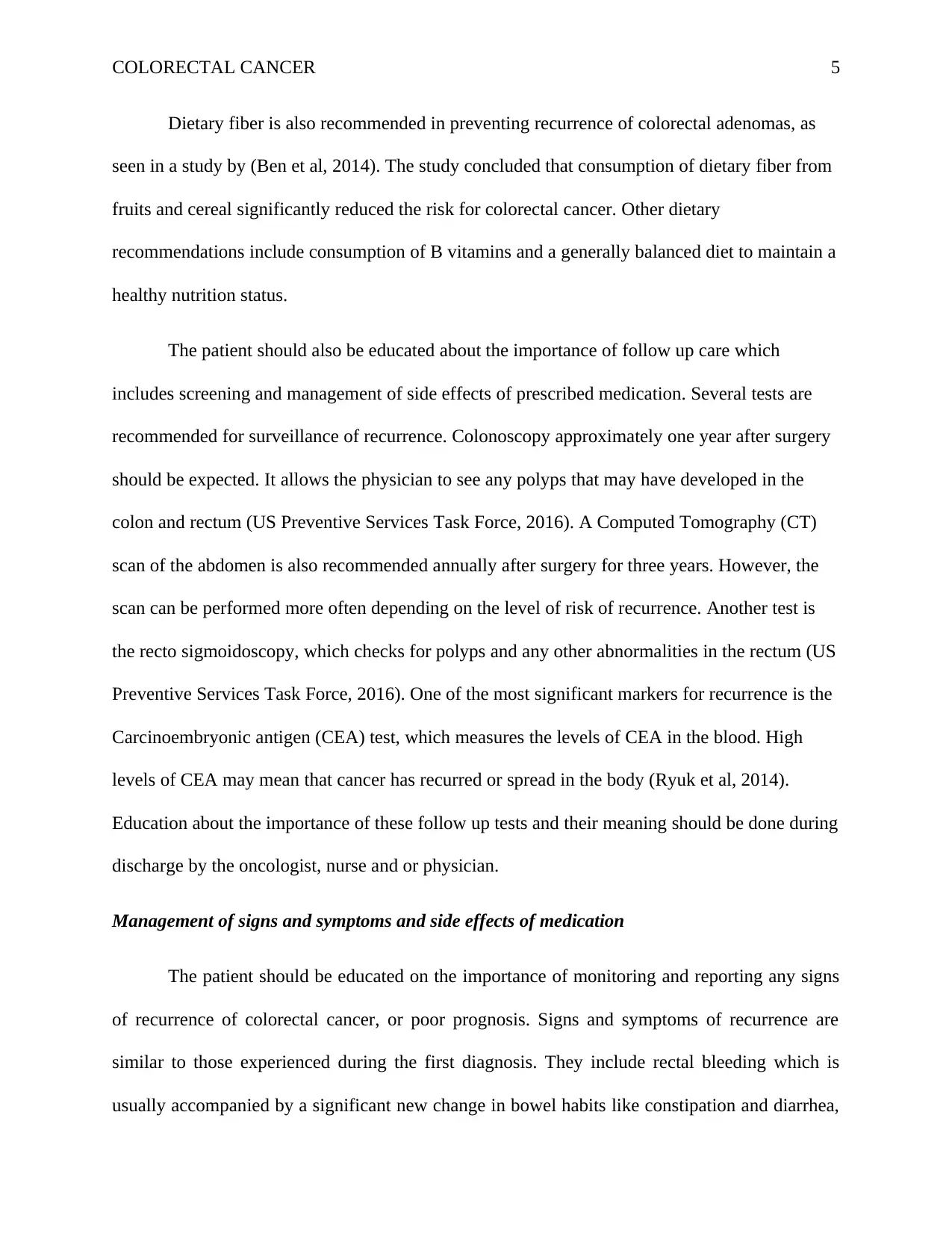
COLORECTAL CANCER 5
Dietary fiber is also recommended in preventing recurrence of colorectal adenomas, as
seen in a study by (Ben et al, 2014). The study concluded that consumption of dietary fiber from
fruits and cereal significantly reduced the risk for colorectal cancer. Other dietary
recommendations include consumption of B vitamins and a generally balanced diet to maintain a
healthy nutrition status.
The patient should also be educated about the importance of follow up care which
includes screening and management of side effects of prescribed medication. Several tests are
recommended for surveillance of recurrence. Colonoscopy approximately one year after surgery
should be expected. It allows the physician to see any polyps that may have developed in the
colon and rectum (US Preventive Services Task Force, 2016). A Computed Tomography (CT)
scan of the abdomen is also recommended annually after surgery for three years. However, the
scan can be performed more often depending on the level of risk of recurrence. Another test is
the recto sigmoidoscopy, which checks for polyps and any other abnormalities in the rectum (US
Preventive Services Task Force, 2016). One of the most significant markers for recurrence is the
Carcinoembryonic antigen (CEA) test, which measures the levels of CEA in the blood. High
levels of CEA may mean that cancer has recurred or spread in the body (Ryuk et al, 2014).
Education about the importance of these follow up tests and their meaning should be done during
discharge by the oncologist, nurse and or physician.
Management of signs and symptoms and side effects of medication
The patient should be educated on the importance of monitoring and reporting any signs
of recurrence of colorectal cancer, or poor prognosis. Signs and symptoms of recurrence are
similar to those experienced during the first diagnosis. They include rectal bleeding which is
usually accompanied by a significant new change in bowel habits like constipation and diarrhea,
Dietary fiber is also recommended in preventing recurrence of colorectal adenomas, as
seen in a study by (Ben et al, 2014). The study concluded that consumption of dietary fiber from
fruits and cereal significantly reduced the risk for colorectal cancer. Other dietary
recommendations include consumption of B vitamins and a generally balanced diet to maintain a
healthy nutrition status.
The patient should also be educated about the importance of follow up care which
includes screening and management of side effects of prescribed medication. Several tests are
recommended for surveillance of recurrence. Colonoscopy approximately one year after surgery
should be expected. It allows the physician to see any polyps that may have developed in the
colon and rectum (US Preventive Services Task Force, 2016). A Computed Tomography (CT)
scan of the abdomen is also recommended annually after surgery for three years. However, the
scan can be performed more often depending on the level of risk of recurrence. Another test is
the recto sigmoidoscopy, which checks for polyps and any other abnormalities in the rectum (US
Preventive Services Task Force, 2016). One of the most significant markers for recurrence is the
Carcinoembryonic antigen (CEA) test, which measures the levels of CEA in the blood. High
levels of CEA may mean that cancer has recurred or spread in the body (Ryuk et al, 2014).
Education about the importance of these follow up tests and their meaning should be done during
discharge by the oncologist, nurse and or physician.
Management of signs and symptoms and side effects of medication
The patient should be educated on the importance of monitoring and reporting any signs
of recurrence of colorectal cancer, or poor prognosis. Signs and symptoms of recurrence are
similar to those experienced during the first diagnosis. They include rectal bleeding which is
usually accompanied by a significant new change in bowel habits like constipation and diarrhea,
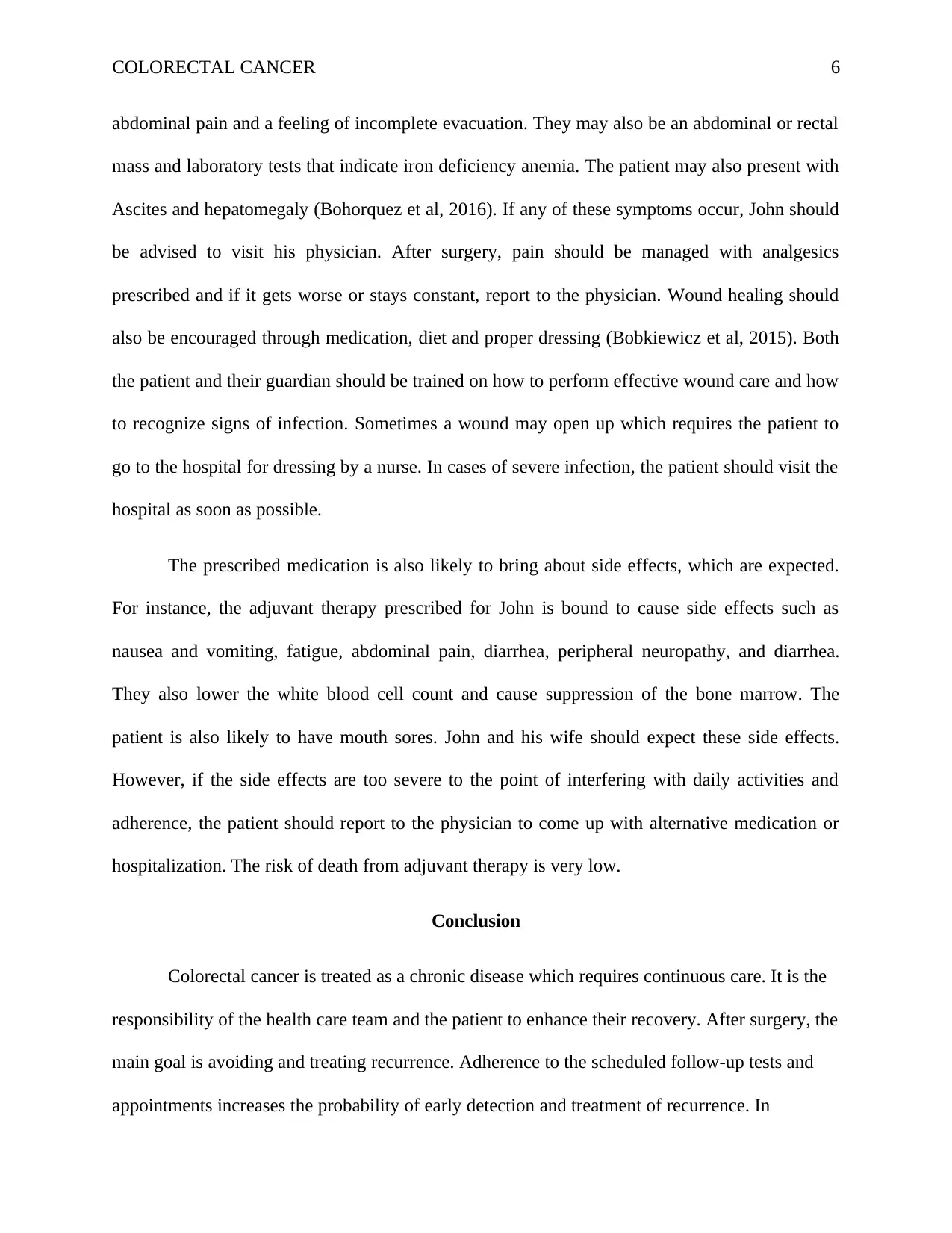
COLORECTAL CANCER 6
abdominal pain and a feeling of incomplete evacuation. They may also be an abdominal or rectal
mass and laboratory tests that indicate iron deficiency anemia. The patient may also present with
Ascites and hepatomegaly (Bohorquez et al, 2016). If any of these symptoms occur, John should
be advised to visit his physician. After surgery, pain should be managed with analgesics
prescribed and if it gets worse or stays constant, report to the physician. Wound healing should
also be encouraged through medication, diet and proper dressing (Bobkiewicz et al, 2015). Both
the patient and their guardian should be trained on how to perform effective wound care and how
to recognize signs of infection. Sometimes a wound may open up which requires the patient to
go to the hospital for dressing by a nurse. In cases of severe infection, the patient should visit the
hospital as soon as possible.
The prescribed medication is also likely to bring about side effects, which are expected.
For instance, the adjuvant therapy prescribed for John is bound to cause side effects such as
nausea and vomiting, fatigue, abdominal pain, diarrhea, peripheral neuropathy, and diarrhea.
They also lower the white blood cell count and cause suppression of the bone marrow. The
patient is also likely to have mouth sores. John and his wife should expect these side effects.
However, if the side effects are too severe to the point of interfering with daily activities and
adherence, the patient should report to the physician to come up with alternative medication or
hospitalization. The risk of death from adjuvant therapy is very low.
Conclusion
Colorectal cancer is treated as a chronic disease which requires continuous care. It is the
responsibility of the health care team and the patient to enhance their recovery. After surgery, the
main goal is avoiding and treating recurrence. Adherence to the scheduled follow-up tests and
appointments increases the probability of early detection and treatment of recurrence. In
abdominal pain and a feeling of incomplete evacuation. They may also be an abdominal or rectal
mass and laboratory tests that indicate iron deficiency anemia. The patient may also present with
Ascites and hepatomegaly (Bohorquez et al, 2016). If any of these symptoms occur, John should
be advised to visit his physician. After surgery, pain should be managed with analgesics
prescribed and if it gets worse or stays constant, report to the physician. Wound healing should
also be encouraged through medication, diet and proper dressing (Bobkiewicz et al, 2015). Both
the patient and their guardian should be trained on how to perform effective wound care and how
to recognize signs of infection. Sometimes a wound may open up which requires the patient to
go to the hospital for dressing by a nurse. In cases of severe infection, the patient should visit the
hospital as soon as possible.
The prescribed medication is also likely to bring about side effects, which are expected.
For instance, the adjuvant therapy prescribed for John is bound to cause side effects such as
nausea and vomiting, fatigue, abdominal pain, diarrhea, peripheral neuropathy, and diarrhea.
They also lower the white blood cell count and cause suppression of the bone marrow. The
patient is also likely to have mouth sores. John and his wife should expect these side effects.
However, if the side effects are too severe to the point of interfering with daily activities and
adherence, the patient should report to the physician to come up with alternative medication or
hospitalization. The risk of death from adjuvant therapy is very low.
Conclusion
Colorectal cancer is treated as a chronic disease which requires continuous care. It is the
responsibility of the health care team and the patient to enhance their recovery. After surgery, the
main goal is avoiding and treating recurrence. Adherence to the scheduled follow-up tests and
appointments increases the probability of early detection and treatment of recurrence. In
⊘ This is a preview!⊘
Do you want full access?
Subscribe today to unlock all pages.

Trusted by 1+ million students worldwide
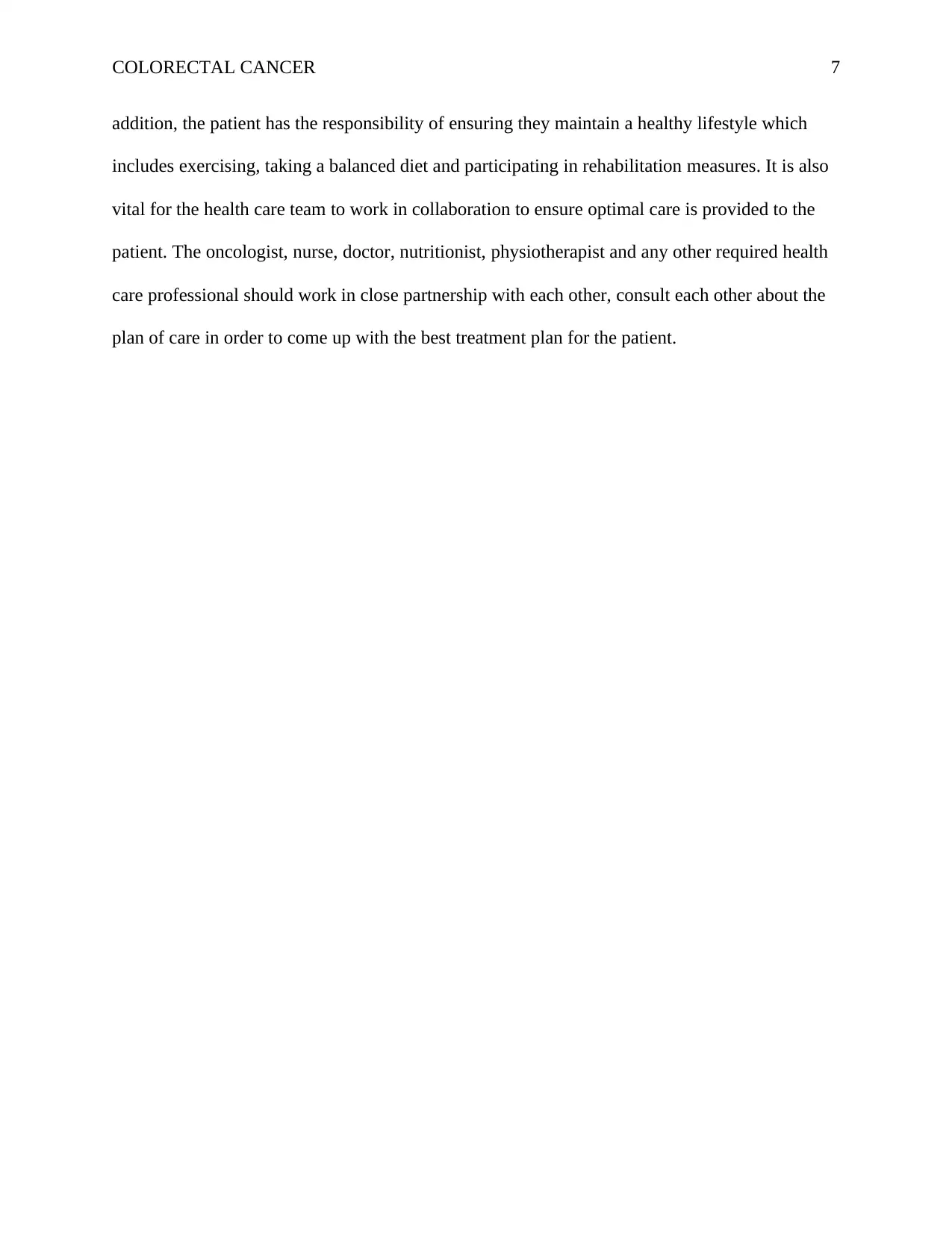
COLORECTAL CANCER 7
addition, the patient has the responsibility of ensuring they maintain a healthy lifestyle which
includes exercising, taking a balanced diet and participating in rehabilitation measures. It is also
vital for the health care team to work in collaboration to ensure optimal care is provided to the
patient. The oncologist, nurse, doctor, nutritionist, physiotherapist and any other required health
care professional should work in close partnership with each other, consult each other about the
plan of care in order to come up with the best treatment plan for the patient.
addition, the patient has the responsibility of ensuring they maintain a healthy lifestyle which
includes exercising, taking a balanced diet and participating in rehabilitation measures. It is also
vital for the health care team to work in collaboration to ensure optimal care is provided to the
patient. The oncologist, nurse, doctor, nutritionist, physiotherapist and any other required health
care professional should work in close partnership with each other, consult each other about the
plan of care in order to come up with the best treatment plan for the patient.
Paraphrase This Document
Need a fresh take? Get an instant paraphrase of this document with our AI Paraphraser
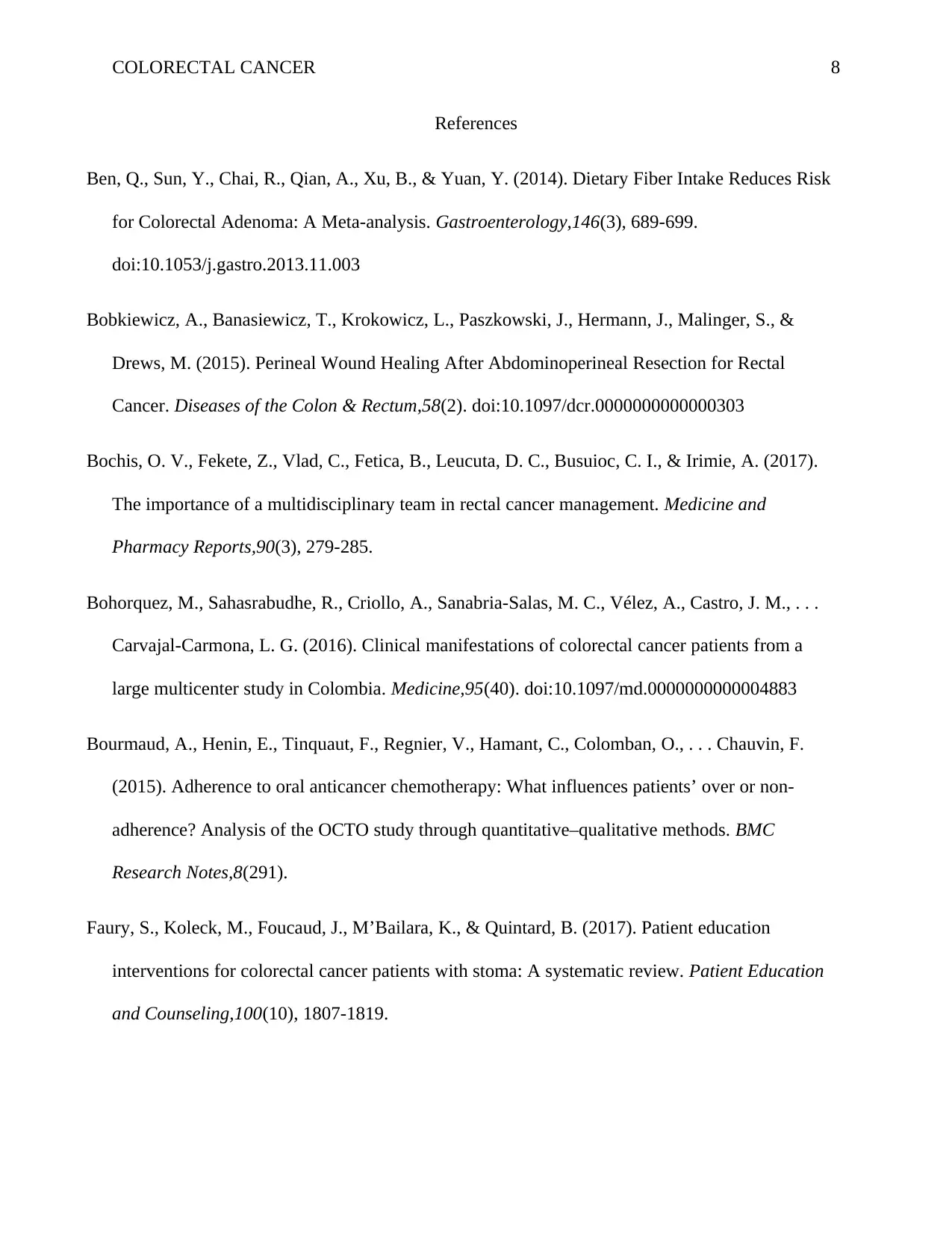
COLORECTAL CANCER 8
References
Ben, Q., Sun, Y., Chai, R., Qian, A., Xu, B., & Yuan, Y. (2014). Dietary Fiber Intake Reduces Risk
for Colorectal Adenoma: A Meta-analysis. Gastroenterology,146(3), 689-699.
doi:10.1053/j.gastro.2013.11.003
Bobkiewicz, A., Banasiewicz, T., Krokowicz, L., Paszkowski, J., Hermann, J., Malinger, S., &
Drews, M. (2015). Perineal Wound Healing After Abdominoperineal Resection for Rectal
Cancer. Diseases of the Colon & Rectum,58(2). doi:10.1097/dcr.0000000000000303
Bochis, O. V., Fekete, Z., Vlad, C., Fetica, B., Leucuta, D. C., Busuioc, C. I., & Irimie, A. (2017).
The importance of a multidisciplinary team in rectal cancer management. Medicine and
Pharmacy Reports,90(3), 279-285.
Bohorquez, M., Sahasrabudhe, R., Criollo, A., Sanabria-Salas, M. C., Vélez, A., Castro, J. M., . . .
Carvajal-Carmona, L. G. (2016). Clinical manifestations of colorectal cancer patients from a
large multicenter study in Colombia. Medicine,95(40). doi:10.1097/md.0000000000004883
Bourmaud, A., Henin, E., Tinquaut, F., Regnier, V., Hamant, C., Colomban, O., . . . Chauvin, F.
(2015). Adherence to oral anticancer chemotherapy: What influences patients’ over or non-
adherence? Analysis of the OCTO study through quantitative–qualitative methods. BMC
Research Notes,8(291).
Faury, S., Koleck, M., Foucaud, J., M’Bailara, K., & Quintard, B. (2017). Patient education
interventions for colorectal cancer patients with stoma: A systematic review. Patient Education
and Counseling,100(10), 1807-1819.
References
Ben, Q., Sun, Y., Chai, R., Qian, A., Xu, B., & Yuan, Y. (2014). Dietary Fiber Intake Reduces Risk
for Colorectal Adenoma: A Meta-analysis. Gastroenterology,146(3), 689-699.
doi:10.1053/j.gastro.2013.11.003
Bobkiewicz, A., Banasiewicz, T., Krokowicz, L., Paszkowski, J., Hermann, J., Malinger, S., &
Drews, M. (2015). Perineal Wound Healing After Abdominoperineal Resection for Rectal
Cancer. Diseases of the Colon & Rectum,58(2). doi:10.1097/dcr.0000000000000303
Bochis, O. V., Fekete, Z., Vlad, C., Fetica, B., Leucuta, D. C., Busuioc, C. I., & Irimie, A. (2017).
The importance of a multidisciplinary team in rectal cancer management. Medicine and
Pharmacy Reports,90(3), 279-285.
Bohorquez, M., Sahasrabudhe, R., Criollo, A., Sanabria-Salas, M. C., Vélez, A., Castro, J. M., . . .
Carvajal-Carmona, L. G. (2016). Clinical manifestations of colorectal cancer patients from a
large multicenter study in Colombia. Medicine,95(40). doi:10.1097/md.0000000000004883
Bourmaud, A., Henin, E., Tinquaut, F., Regnier, V., Hamant, C., Colomban, O., . . . Chauvin, F.
(2015). Adherence to oral anticancer chemotherapy: What influences patients’ over or non-
adherence? Analysis of the OCTO study through quantitative–qualitative methods. BMC
Research Notes,8(291).
Faury, S., Koleck, M., Foucaud, J., M’Bailara, K., & Quintard, B. (2017). Patient education
interventions for colorectal cancer patients with stoma: A systematic review. Patient Education
and Counseling,100(10), 1807-1819.
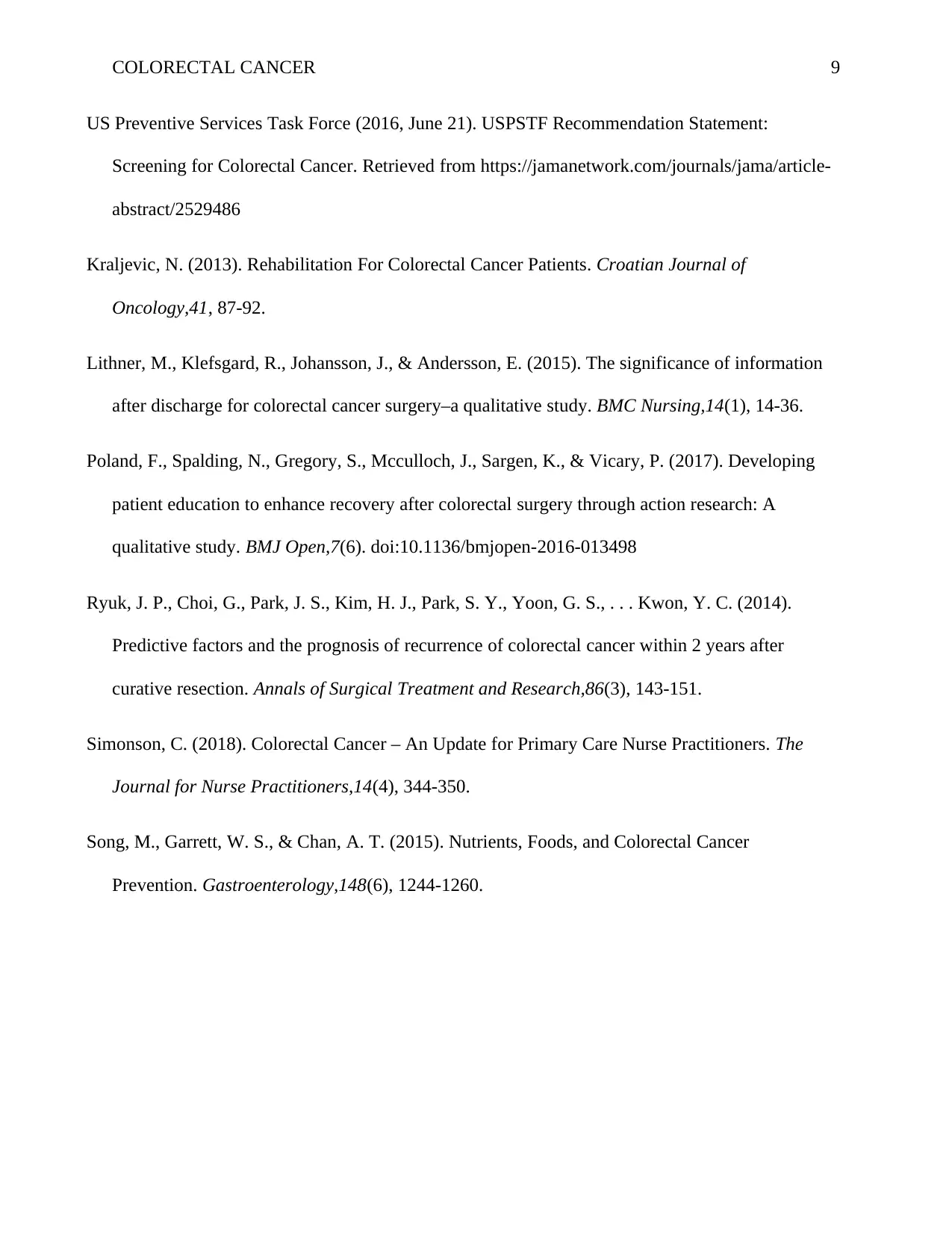
COLORECTAL CANCER 9
US Preventive Services Task Force (2016, June 21). USPSTF Recommendation Statement:
Screening for Colorectal Cancer. Retrieved from https://jamanetwork.com/journals/jama/article-
abstract/2529486
Kraljevic, N. (2013). Rehabilitation For Colorectal Cancer Patients. Croatian Journal of
Oncology,41, 87-92.
Lithner, M., Klefsgard, R., Johansson, J., & Andersson, E. (2015). The significance of information
after discharge for colorectal cancer surgery–a qualitative study. BMC Nursing,14(1), 14-36.
Poland, F., Spalding, N., Gregory, S., Mcculloch, J., Sargen, K., & Vicary, P. (2017). Developing
patient education to enhance recovery after colorectal surgery through action research: A
qualitative study. BMJ Open,7(6). doi:10.1136/bmjopen-2016-013498
Ryuk, J. P., Choi, G., Park, J. S., Kim, H. J., Park, S. Y., Yoon, G. S., . . . Kwon, Y. C. (2014).
Predictive factors and the prognosis of recurrence of colorectal cancer within 2 years after
curative resection. Annals of Surgical Treatment and Research,86(3), 143-151.
Simonson, C. (2018). Colorectal Cancer – An Update for Primary Care Nurse Practitioners. The
Journal for Nurse Practitioners,14(4), 344-350.
Song, M., Garrett, W. S., & Chan, A. T. (2015). Nutrients, Foods, and Colorectal Cancer
Prevention. Gastroenterology,148(6), 1244-1260.
US Preventive Services Task Force (2016, June 21). USPSTF Recommendation Statement:
Screening for Colorectal Cancer. Retrieved from https://jamanetwork.com/journals/jama/article-
abstract/2529486
Kraljevic, N. (2013). Rehabilitation For Colorectal Cancer Patients. Croatian Journal of
Oncology,41, 87-92.
Lithner, M., Klefsgard, R., Johansson, J., & Andersson, E. (2015). The significance of information
after discharge for colorectal cancer surgery–a qualitative study. BMC Nursing,14(1), 14-36.
Poland, F., Spalding, N., Gregory, S., Mcculloch, J., Sargen, K., & Vicary, P. (2017). Developing
patient education to enhance recovery after colorectal surgery through action research: A
qualitative study. BMJ Open,7(6). doi:10.1136/bmjopen-2016-013498
Ryuk, J. P., Choi, G., Park, J. S., Kim, H. J., Park, S. Y., Yoon, G. S., . . . Kwon, Y. C. (2014).
Predictive factors and the prognosis of recurrence of colorectal cancer within 2 years after
curative resection. Annals of Surgical Treatment and Research,86(3), 143-151.
Simonson, C. (2018). Colorectal Cancer – An Update for Primary Care Nurse Practitioners. The
Journal for Nurse Practitioners,14(4), 344-350.
Song, M., Garrett, W. S., & Chan, A. T. (2015). Nutrients, Foods, and Colorectal Cancer
Prevention. Gastroenterology,148(6), 1244-1260.
⊘ This is a preview!⊘
Do you want full access?
Subscribe today to unlock all pages.

Trusted by 1+ million students worldwide
1 out of 9
Related Documents
Your All-in-One AI-Powered Toolkit for Academic Success.
+13062052269
info@desklib.com
Available 24*7 on WhatsApp / Email
![[object Object]](/_next/static/media/star-bottom.7253800d.svg)
Unlock your academic potential
Copyright © 2020–2025 A2Z Services. All Rights Reserved. Developed and managed by ZUCOL.





